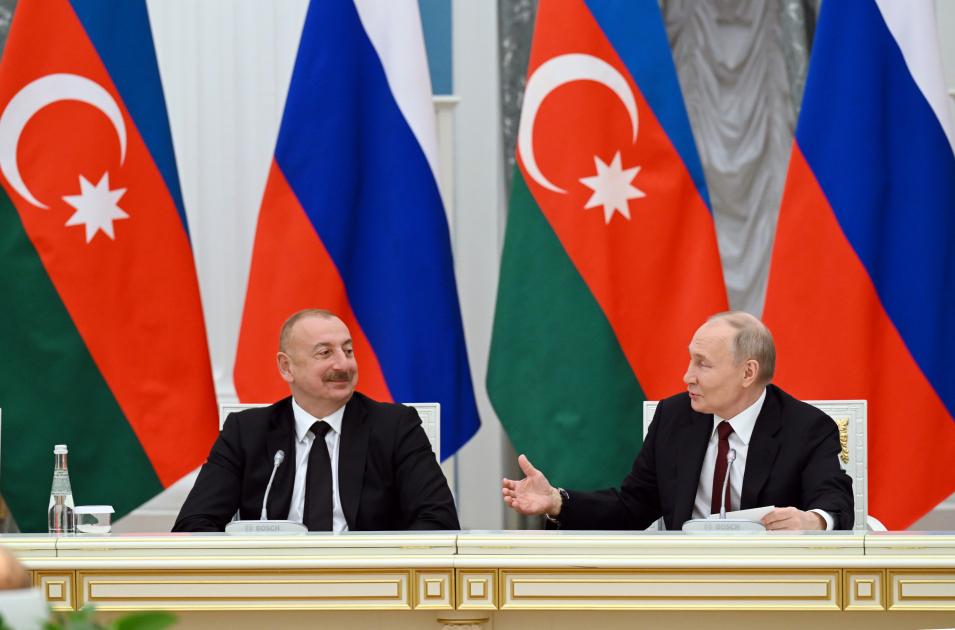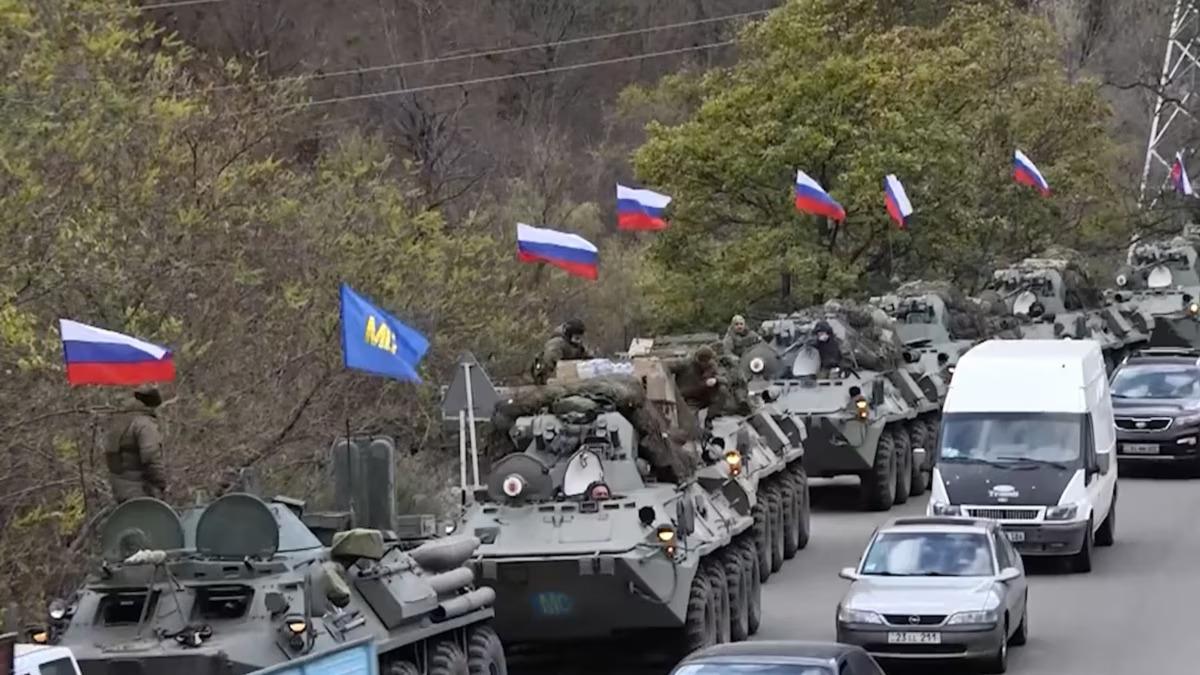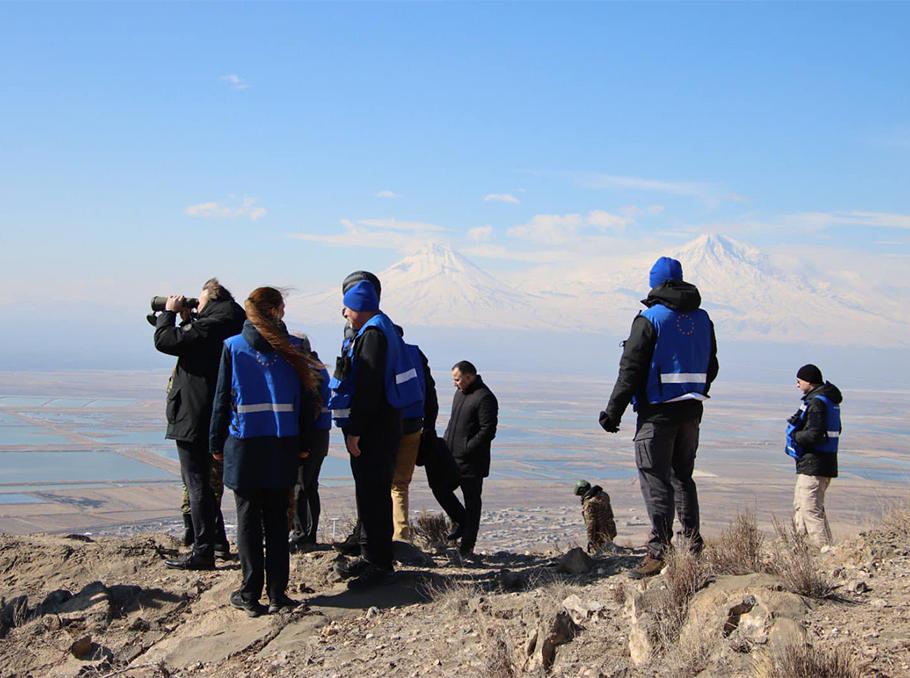Bilateral relations, regional dynamics, & peacekeepers’ withdrawal Key takeaways from President Aliyev's Moscow visit
Azerbaijani President Ilham Aliyev's April 22 visit to Moscow, marked by a one-on-one meeting with President Vladimir Putin and a commemoration of the 50th anniversary of the Baikal-Amur mega project of the Soviet period alongside veteran workers, holds profound significance.
The meeting was the first face-to-face contact between the two presidents since their re-election in 2024 and underscores the strong diplomatic ties between Azerbaijan and Russia. Such high-level engagements provide opportunities for strategic discussions on various regional and global issues, including security, economic cooperation, and cultural exchange.
In 2023, Azerbaijan constituted 0.4% of Russia's foreign trade turnover, ranking third among its trade partners after Italy and Turkey. Bilateral trade between Russia and Azerbaijan in 2023 increased by 17.5% to $4.358bn, comprising 8.52% of Azerbaijan's total foreign trade turnover. However, in January-March 2024, trade turnover decreased by 15.8% compared to the same period in 2023, totaling nearly $890m. (https://tass.ru/info/20611439)
Russia exports food products, machinery, metals, equipment, and timber to Azerbaijan, while Azerbaijan mainly exports mineral resources, textiles, cotton, and agricultural products to Russia. Over 1,400 companies with Russian capital are registered in Azerbaijan, with major Russian entities like Gazprom, Lukoil, VTB Bank, Avtovaz, and Rosselkhozbank involved. Notably, Russian investments in Azerbaijan exceed $8.7bn, while Azerbaijan has invested over $1bn in Russia. In 2023, direct Russian investments in Azerbaijan amounted to $295m.

Second, the joint commemoration of the Baikal-Amur project's milestone highlights the historical cooperation between the two nations. This mega-project not only symbolizes shared achievements but also serves as a testament to the enduring partnership in infrastructure development and economic collaboration.
Third, the discussion of the North-South transport project reflects a broader vision for regional connectivity and trade facilitation. This ambitious corridor, spanning from India to Russia's St. Petersburg, underscores the pivotal role of Azerbaijan as a key transit hub in the Eurasian region. The project holds immense potential for enhancing regional integration, boosting economic growth, and fostering closer ties between participating nations.
Russia and Azerbaijan share a 338-km border, governed by agreements signed in September 2010, including a visa-free regime. Cooperation extends to the rational use of the Samur River, with a 50/50 usage agreement. Over 70 Russian regions engage in cooperation with Azerbaijan, with 12 agreements covering various sectors. The XII Russian-Azerbaijani Interregional Forum in February 2024 focused on transportation, logistics, and environmental issues.
In education, Azerbaijan maintains Russian-language instruction in schools and universities, with projects to deepen Russian language study and branches of Russian universities in Baku. The countries also cooperate in the social sphere, with an agreement on pension cooperation signed in 2022, allowing for pension payments and labor experience transfers between the nations.
Overall, the president's visit to Moscow reinforces the multifaceted nature of Azerbaijani-Russian relations and reaffirms the commitment to cooperation and partnership on various fronts, from political dialogue to economic development and beyond.
End of Russian military presence in Azerbaijan
The early withdrawal of Russian peacekeepers from Karabakh and the return of four villages to Azerbaijan during the border demarcation and delimitation process with Armenia provide an opportunity to reinvigorate the dialog. Following Ilham Aliyev's visit, Armenian Prime Minister Nikol Pashinyan is expected to have important discussions in Moscow over Yerevan's foreign policy direction. At their meeting, the Azerbaijani and Russian presidents delved into enhancing the strategic partnership and alliance between their countries, as well as exchanging views on key regional issues.
The 50th anniversary of the start of the construction of the Baikal-Amur mainline marked an important milestone. It provided a significant opportunity for Ilham Aliyev and Vladimir Putin to meet and mull urgent issues on the agenda. Heydar Aliyev, Former Deputy Chairman of the USSR Council of Ministers and the father of the current Azerbaijani president played a key role in overseeing the construction of the Baikal-Amur mega project.
The necessity of promptly initiating personal communication between the leaders of Russia and Azerbaijan following the onset of new political cycles is driven by the evolving circumstances in the South Caucasus region. The current situation appears precarious, presenting various potential scenarios for the region's development and security, involving competing interests from Russia and the West.

Just before President Aliyev's visit, the unexpected announcement in Moscow and Baku regarding the premature withdrawal of Russian peacekeepers from Karabakh, whose mandate was scheduled to last until November 2025, hit the headlines. This development sparked widespread speculation and debate in Russia, Azerbaijan, and Armenia, with experts putting forth diverse theories and interpretations.
The need to give a quick start to personal contacts between the two leaders after the start of new political cycles in Russia and Azerbaijan is dictated by the changing situation in the South Caucasus. This situation looks unstable and opens up several alternative scenarios for the development of the region and its security with the participation of competing players - Russia on the one hand and the West on the other.
The recent decision to withdraw Russian peacekeepers from Karabakh marks a significant milestone in regional security enhancement. This move was deemed essential due to the absence of necessity for their presence in Karabakh following the voluntary abandonment of the region by Armenians.
Azerbaijan has demonstrated its capability and resources to maintain full control over this part of its territory, as it does over all other remaining territories. Moscow's recognition of Baku's capacity to effectively manage such matters underscores the rationale behind the withdrawal.
This decision also underscores the strong personal trust between Presidents Putin and Aliyev, who collaborate closely on addressing critical regional security issues. Moreover, the early withdrawal, occurring a year and a half ahead of the previously agreed timeline in the trilateral statement of November 10, 2020, was influenced by emerging security threats in the region. These include Armenia's intentions to align with Euro-Atlantic structures and Western efforts to extend a "security umbrella" over Yerevan through the US and NATO.

Armenia had previously used the presence of Russian peacekeepers in Karabakh as justification for increased Western involvement on its soil, aiming to counterbalance Russian influence with Western support. Consequently, this led to heightened Western activity in Armenia, such as the deployment of European observers along the border with Azerbaijan, perceived by Moscow and Baku as a covert EU military-police operation. Concerns also arose regarding other forms of Western infiltration under the guise of humanitarian missions.
However, the narrative of using Russian peacekeepers as a pretext for Western involvement in Armenia has lost its credibility. This shift in dynamics became particularly significant as it coincided with high-level negotiations between Russia and Azerbaijan in the Kremlin.








